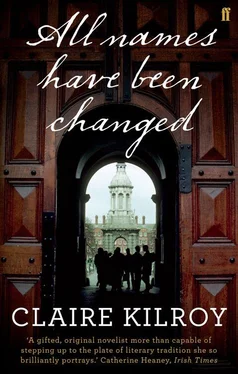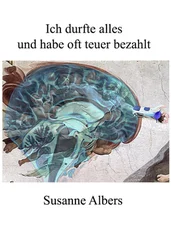Claire Kilroy - All Names Have Been Changed
Здесь есть возможность читать онлайн «Claire Kilroy - All Names Have Been Changed» весь текст электронной книги совершенно бесплатно (целиком полную версию без сокращений). В некоторых случаях можно слушать аудио, скачать через торрент в формате fb2 и присутствует краткое содержание. Год выпуска: 2010, Издательство: Faber & Faber, Жанр: Современная проза, на английском языке. Описание произведения, (предисловие) а так же отзывы посетителей доступны на портале библиотеки ЛибКат.
- Название:All Names Have Been Changed
- Автор:
- Издательство:Faber & Faber
- Жанр:
- Год:2010
- ISBN:нет данных
- Рейтинг книги:5 / 5. Голосов: 1
-
Избранное:Добавить в избранное
- Отзывы:
-
Ваша оценка:
- 100
- 1
- 2
- 3
- 4
- 5
All Names Have Been Changed: краткое содержание, описание и аннотация
Предлагаем к чтению аннотацию, описание, краткое содержание или предисловие (зависит от того, что написал сам автор книги «All Names Have Been Changed»). Если вы не нашли необходимую информацию о книге — напишите в комментариях, мы постараемся отыскать её.
All Names Have Been Changed — читать онлайн бесплатно полную книгу (весь текст) целиком
Ниже представлен текст книги, разбитый по страницам. Система сохранения места последней прочитанной страницы, позволяет с удобством читать онлайн бесплатно книгу «All Names Have Been Changed», без необходимости каждый раз заново искать на чём Вы остановились. Поставьте закладку, и сможете в любой момент перейти на страницу, на которой закончили чтение.
Интервал:
Закладка:
Despite our tongue-tied stage fright, we came away discerning from whatever way Glynn had responded, whatever glance he had thrown in our direction — this communication must not have been forged through words, seeing as none of us could remember him saying any — each of us came away from the signing believing that he loved us. He may not have said as much, but we felt his love as strongly as we hoped he felt ours. It wasn’t a trick, it wasn’t a delusion, it wasn’t a testament to what a professional he was. His love was perceptible in a capacity that is impossible to define, being expressed not through word or sign, but directed at the soul. Our soul. Glynn hated that word.
We spilled out into the filthy city afterwards, the five of us, and slipped back unnoticed into the driving rain, not to meet for another four years. I was aware as I crossed onto South Anne Street of a foolish reluctance to glance back at the Academy lest it already be magicked away. I longed to be back there the moment I left, amongst the warmth, the shuffling bodies, the lowered voices, the comforting fug. Once, as a small boy, I had hidden in the cloakroom when the school bell rang and spent a happy morning amongst duffel coats and the contents of classmates’ pockets while the school day went on as normal without me. All my life I have been trying to return there.
*
‘Do you think he really loved us?’ Antonia once asked me, apropos of nothing. She wasn’t even drunk. We’d been crossing Front Square when she detained me with a gloved hand and made me turn to face her. It was unusual for Antonia and me to be alone together. This was not a permutation into which the group naturally fell.
Night was almost upon us. The air was growing glutinous, mottled as the cobbles underfoot. The darkness exaggerated Antonia’s already dramatic features. She was all mouth and eyes staring urgently up at me, as if my answer mattered to her; Antonia, who generally barely registered my presence. I’d either stopped hating her by then, or had not yet started. She’d voiced the question quietly, careful that no one should overhear, choosing me and not one of the others presumably on the reasoning that I was the sole member of the group who would not lie to her out of common decency, possessing, in her opinion, no shred of it. Whatever way she’d inflected the question made me unexpectedly want to hold her, hold the ball of nervy sinews and resentful bones that was her.
‘I do,’ I affirmed as vigorously as I could, conscious of how difficult it must have been for a woman like Antonia to have used as intimate a term as ‘love’, in light of its spectacular failure in her life. I wanted her to know that she was in safe company now, that the restrictions she had experienced in her relationships hitherto no longer applied with us. ‘I do, Antonia, I firmly believe he loved us. There is not a shadow of doubt in my mind.’
She accepted this information with a nod of agreement — Glynn’s love had felt real to her too — and then she threw me an imploring, almost panicked, glance, which exposed the fragility I hadn’t discerned in her until then.
‘Well, goodbye then, Declan,’ she said, knotting the belt on her long black coat, having learned the invaluable lesson that every mother should teach her daughter, apparently: that a decent winter coat is a good all-round defence against whatever life might throw at you. That, and a good haircut. We hovered by Front Arch a second longer, wondering how to part. This delay decided matters. Antonia abruptly set off alone on her patent stilettos, as if we hadn’t previously been travelling in the same direction. The incident was never mentioned again, but I was glad of the exchange. I don’t think I ever really hated Antonia, when it comes down to it. It was just a way of channelling insurmountable emotions.
3 Tarry Glynn
I met a woman once who claimed she’d known Glynn as a child, and I can find no reason to doubt her account of him. I had been sitting on my own in the lounge area of a public house in Leeds one Sunday afternoon in the December of 1984 reading Glynn’s first novel, Prussian Blue , a second time (just twenty-four years of age when he published it — what hope was there for the rest of us?) when the woman seated next to me on the wall-to-wall banquette leaned across to my table. She wore a gold T-bar rope chain over her royal-blue polo-neck jumper, and a black mohair cardigan over that again, stray fibres of which she picked off her lip from time to time like strands of loose tobacco. She had been observing me for some minutes.
‘I was in national school with your man,’ she finally remarked, nodding at my paperback. Her accent was rural Irish, right enough. ‘A holy terror,’ she added with satisfaction, pursing her lips in a manner that said, Go on, ask me more . She folded her arms and gave herself a brisk squeeze of pleasure at the prospect of throwing in her tuppence worth. We are a nation that likes nothing better than a good story, preferably featuring one of our own, ideally the parish black sheep, and few could hold a candle to Glynn in that field. I frowned at his author photograph on the back of Prussian Blue to confirm we were discussing the same individual. ‘That’s the boyo,’ said the woman, ‘the very man,’ and indeed she looked the correct vintage to have been in Glynn’s class: mid-fifties, thereabouts.
‘In Wicklow, was this?’ I asked her.
‘Arklow,’ she asserted.
‘I see.’ So she knew what she was talking about. I was all ears after that.
Glynn’s childhood remains what you might call a grey area. It is difficult to even conceive of him as a boy, if the truth be told. Just one short story in his body of work is told from the point of view of a child. The powerful evocations of childhood which characterise the novels are refracted through the narrative agency of a grown man casting his mind back (for yes, they are all male, Glynn’s protagonists — all male, all to blame, all contrite to the point of belligerence). Little is recorded of Glynn’s early years save for a few bald facts such as which schools he attended, and when. Dr M. J. Hanratty’s otherwise exhaustively researched biography, Glynn: An Irish Paradox (Oxford University Press, 1982), glosses over the topic in a matter of paragraphs. Glynn himself joked in an interview with the London Times that he sprang forth fully grown on the 18th of April 1952, at the age of twenty-one. This was the date his first piece of writing was published, a short story in the Irish Press . ‘ Homopoeticus was born,’ he was quoted as saying, borrowing the phrase from Nabokov without accrediting him. ‘Life before writing was hardly a life for me at all,’ he elaborated when queried by the interviewer why he so casually discounted his childhood.
Here follows a little cited fact: for a period of eighteen months commencing in 1948, Glynn was a seminarian. After completing his secondary-school education he entered St Patrick’s College, Maynooth, to study to be a priest. Has enough been made of this biographical detail, I wonder? Glynn doesn’t exactly conceal this information so much as not exactly publicise it either. Should photographs of him in his cassock exist I have so far failed to come across them, notwithstanding my great curiosity and renowned attention to detail.
Mention is always made in the Note on the Author printed on Glynn’s dust jackets of the four years he spent reading Classics in Trinity — something of a novelty for Catholics at the time — but never a whisper of his spell in Maynooth. He was asked about it on the night of his public reading in the Royal Irish Academy, which was the first I’d heard of him harbouring religious inclinations. It made sense, though, when you thought about it. He had an uncommon capacity for awe. ‘It’s no secret,’ Glynn responded, as if the questioner had suggested it was. He did not elucidate on the subject beyond this statement.
Читать дальшеИнтервал:
Закладка:
Похожие книги на «All Names Have Been Changed»
Представляем Вашему вниманию похожие книги на «All Names Have Been Changed» списком для выбора. Мы отобрали схожую по названию и смыслу литературу в надежде предоставить читателям больше вариантов отыскать новые, интересные, ещё непрочитанные произведения.
Обсуждение, отзывы о книге «All Names Have Been Changed» и просто собственные мнения читателей. Оставьте ваши комментарии, напишите, что Вы думаете о произведении, его смысле или главных героях. Укажите что конкретно понравилось, а что нет, и почему Вы так считаете.












